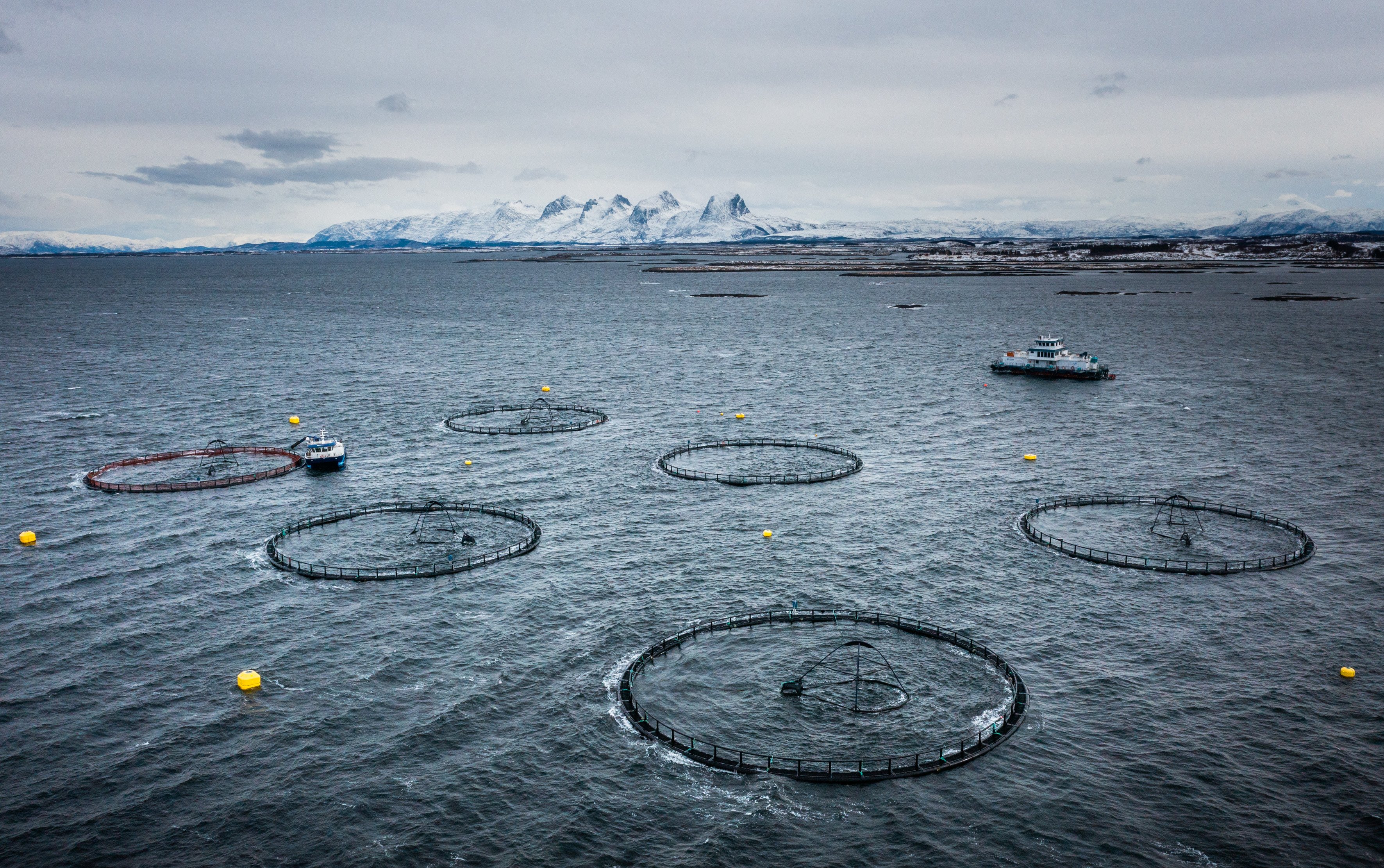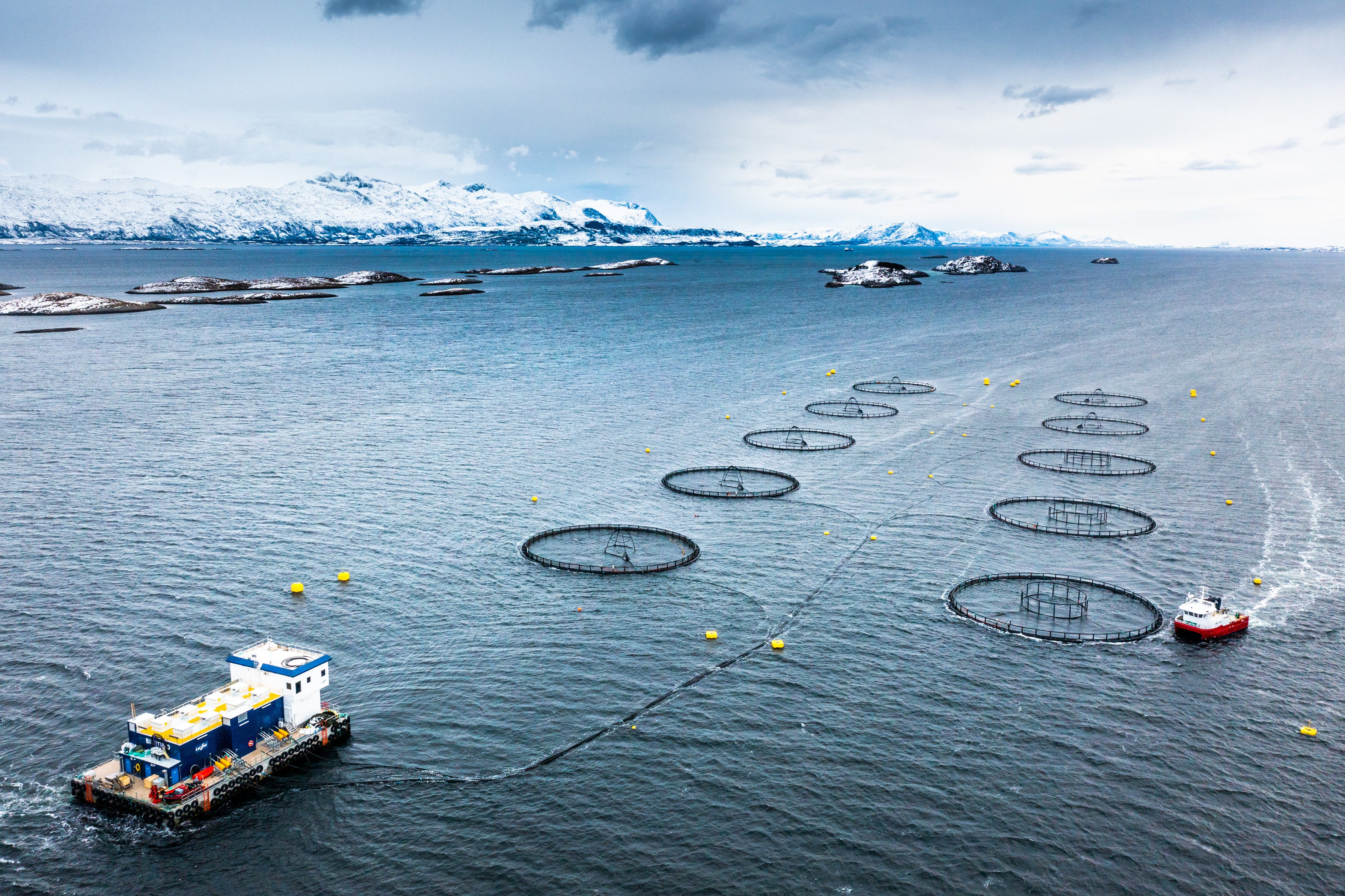In partnership with LetSea and Nofima, Aker BioMarine submitted its application to the Norwegian Directorate of Fisheries to conduct research within salmon farming and aquafeed. The goal is to increase the share of krill and other raw materials used in fish feed formulations today, and shed light on new opportunities within the ingredients, aquafeed, and aquaculture industry.
Norway has an ambition to more than triple the production of salmon and trout by 2050, at the same time the government has set a target that all fish feed in Norway must be from sustainable sources by 2030. To achieve sustainable growth in seafood production, the Norwegian aquaculture industry must quickly ramp up the use of new raw materials in aquafeed. Currently, Aker BioMarine is one of few global players that has successfully introduced and scaled a new raw material, Antarctic krill, from idea to more than 50,000 tonnes of ingredients produced annually.
Aker BioMarine aims to bring its knowledge and experience to a new, large-scale research trial, to be conducted in collaboration with LetSea, the experimental and research center for aquaculture, along with the research institution Nofima. Their joint project has been named the "Raw Material Revolution", a name that signifies the urgent need for more sustainable ingredients in a rapidly growing aquaculture industry.
Together, the three companies plan to evaluate the performance of krill, as well as other, new raw material ingredients, when included in the fish feed.
“If we receive approval, we plan to test seven new raw materials within seven years, with the goal of increasing the combination of new raw materials in fish feed from 0.4 percent to 25 percent by 2030," said Matts Johansen, CEO Aker BioMarine, during a panel discussion at the Bellona “Raw Materials Pledge” event on Tuesday, November 29.
The Raw Materials Pledge is a movement within the Norwegian seafood industry to stimulate greater diversity and sustainability in aquafeed raw materials. The companies that have pledged support include Aker BioMarine, Skretting, Lerøy and Sjømat Norway – headed by Bellona. The shared ambition is to increase knowledge and awareness about new raw materials. Together, the group presented their report on this topic to the Minister of Fisheries and Ocean Policy, Bjørnar Skjæran, during the Bellona event.
 Photo: LetSea
Photo: LetSea
From a passive to an active role
By applying for research permits, Aker BioMarine will help pave the way for new, sustainable raw materials.
"The role of the raw material suppliers, including Aker BioMarine, has been passive until now, especially during large-scale trials conducted under real farming conditions, even when our own raw materials have been used in fish feed. This project differs from other studies in that we want to focus on the importance of raw materials in the final feed formulation and evaluate a combination of new raw materials. With this project, we are now taking a much more active role by running our own large-scale research," adds Johansen.
Since 2006, Aker BioMarine has harvested, processed, marketed, and sold krill products as an ingredient in fish and animal feed, in addition to omega-3 supplements for humans. Today the company has a separate department dedicated to research and development which consists of 15 employees with PhDs who have published more than 200 scientific articles.
"Refining a new ingredient and introducing it to the market is both expensive and time-consuming. Aker BioMarine spent 15 years researching and documenting the effects of krill alone. The aquaculture industry needs to see much faster development,” explains Johansen.
“With research permits from the Norwegian Directorate of Fisheries, it is possible to carry out necessary and important research that will help us mitigate future risk related to sustainability within aquaculture. The approval for this research is a green light for us to increase our knowledge and stimulate greater sustainable growth across the industry,” he adds.
"We need to move quickly."
As part of the research collaboration, Aker BioMarine, Nofima and LetSea will each contribute with their own expertise and experience, stemming from across the industry and through previous studies. Together, the companies aim to produce robust documentation of new and sustainable feed.
Nofima, who will hold the scientific responsibility within this research project, has a long track record of conducting research within the aquaculture and fisheries industries, among other areas. For several years, Nofima has worked to document new, sustainable ingredients for salmon feed on both a small and large scale.
"The industry wants to use a greater amount of new, sustainable ingredients, and we need to move quickly to do so. Large-scale research is a necessary tool for success, and we have the knowledge and set-up required to contribute to the development of new raw materials for feed," says Bente Torstensen, Division Director at Nofima.
LetSea is Norway's largest research center for aquaculture.
"It’s no coincidence that this project will take place in Helgeland at LetSea. We have worked with research in multiple areas, every day, since 2001. If the industry is to succeed, we are dependent on driving these kinds of initiatives," says Henriette Hanssen, R&D Director at LetSea.
 Photo: LetSea
Photo: LetSea
The Raw Materials Pledge, goals
-
Accelerating the identification, development, industrialization and phasing in of new and sustainable raw materials for fish feed.
-
Enable increased production of seafood and reduce the overall climate and environmental footprint of the aquaculture industry.
-
Stimulate new innovation, industry and jobs in Norway.
-
Focus on sustainable raw materials with commercial potential, and which are nutritionally correct for the welfare and growth of the fish.
This is Aker BioMarine
-
Aker BioMarine is a biotechnology and krill fishing company that develops krill-based ingredients.
-
The company, which is listed on the Oslo Stock Exchange, and has over 420 employees worldwide. Headquarters in Oslo.
-
It has a separate department dedicated to research and development with 15 employees with PhDs and over 200 published scientific articles.
-
Aker BioMarine's transparent value chain extends from the sustainable harvesting of krill in Antarctic waters, via the company's hub for logistics in Montevideo, to the production facility in Houston, and on to customers around the world.
This is LetSea
-
LetSea is Norway's largest privately owned trial and research center for aquaculture, with a total of 70 employees who specialize in running trials.
-
The company has as many as 230 experimental units, each capable of conducing trials that extend throughout the life cycle of the fish. The facilities are divided into land-based research, small-scale cages, and full-scale trials.
-
With its nutrition-focused starting point, LetSea is focused on sustainable production, improved fish health, and reduced environmental footprint. While their assignments cover a wide range of research and trial types, the company specializes within the areas of fish health and nutrition.
This is Nofima
-
Nofima is a food- and nutrition-focused research institute owned by the Norwegian Directorate of Trade, Industry and Fisheries (56.8%), the Foundation for Agricultural Food Research (32.2%) and Akvainvest Møre og Romsdal (10%).
-
It consists of 393 employees and has more than 600 ongoing research projects in 29 different countries.
-
Nofima’s research fields are within aquaculture, fisheries, and land-based food production.
-
The head office is in Tromsø with branches in Ås, Stavanger, Bergen and Sunndalsøra.